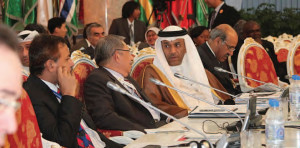
Summit in Dushanbe
MUSTAK PARKER reports on a plea for ‘a dedicated, qualified, modern, single globally accepted Shariah Committee’
Kuala Lumpur and Dushanbe are not exactly known for their revolutionary zeal. It is in these two capitals, however, that the patriarch of Islamic development finance, Dr Ahmad Mohamed Ali, President of the Islamic Development Bank (IDB) Group, perhaps the most unlikeliest revolutionary in history, decided to voice some of the most contentious issues facing the multilateral development bank of the Muslim world and the Islamic finance industry per se.
These are uniform global Shariah standards, and capital and resource mobilisation.
At the 10th Annual Summit of the Islamic Financial Services Board (IFSB) held recently in Malaysia, Dr Ali called for the establishment of a single globally accepted Shariah Committee of Last Resort, which would introduce uniform standards and give the global Islamic finance industry much-needed structure.
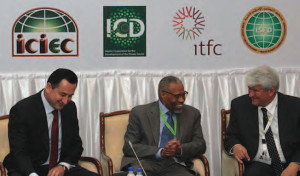
“The IDB and IFSB,” maintained Dr Ali, “should study ways for creating globally acceptable references for the (Islamic finance) industry for the benefit of all. This could include striving for the concept of a globally accepted Shariah committee or body, which would be able to assist all Islamic financial institutions and bring them in line with a uniform standard. This is very important as it gives a much-needed structure to the industry, thus enabling it to be more stable and allowing it to grow further.
The call for uniform Shariah standards for the Islamic finance industry is not new. There are those who emphasis that the IDB should have called for this some two decades ago. But it is better late than never. What is new, however, is that the IDB, normally an ultra-conservative highly bureaucratic institution, should be pressing for a new global Apex Shariah Body that would effectively set the standard rules of the game for the application of Fiqh Al Muamalat (Islamic laws relating to financial transactions) in the global industry.
There are of course several global Shariah bodies – the Makkah-based Islamic Fiqh Academy of the OIC (Organisation of Islamic Cooperation); the Shariah Committee of the World Muslim Congress (Rabita); and the Shariah Committee of AAOIFI (the Accounting and Auditing Organisation for Islamic Financial Institutions).
But these are largely ad hoc bodies, bereft of adequate resources, structure, leadership and modern scientific research capability, and that are not necessarily specialised in Fiqh Al Muamalat and the various rubrics of a modern economic and financial system.
As such, Dr Ali’s call for the establishment of a dedicated, qualified, modern, single globally accepted Shariah Committee makes sense. Indeed, bankers have long argued that the lack of such a body has impacted directly on Islamic finance business lines such as Sukuk and the more controversial Commodity Murabaha (Tawarruq).
The lack of such an apex authority has meant a virtual free-for-all in Shariah advisory in some markets. The notable exception is Malaysia, which remains the only jurisdiction that has its own national apex Shariah body and where Shariah advisories in banking, finance and insurance have to be registered by the two regulators – Bank Negara Malaysia (the central bank) and the Securities Commission Malaysia.
In contrast, notably in Saudi Arabia, Shariah advisory and governance is a free-for-all because of a complete lack of engagement by the financial policy makers and regulators under the misguided belief that this is a function of the industry and market.
Unfortunately, market players and Shariah scholars in the Kingdom are reluctant (or afraid) to stand up to the Saudi regulators especially the Saudi Arabian Monetary Agency (SAMA) on Shariah matters relating to finance and insurance or the lack of it.
Take, for instance, the debacle surrounding co-operative insurance in the Kingdom, which is the only form of insurance allowed under the Cooperative Insurance Law. Despite the claim that it is Shariah-compliant, there are no fatwas or globally-accepted Shariah structures such as Wakala (agency), Waqf (endowment) or Tabarru (donation) underpinning the concept.
SAMA, according to several Takaful players, refuse to engage meaningfully on whether cooperative insurance is indeed Shariah-compliant or not, and whether Takaful can be practised in the Kingdom based on the above accepted Shariah structures.
SAMA, which is racked by internal politics and in-fighting as manifested by the abrupt resignation in May of Deputy Governor, Abdul Rahman Al-Khallaf, recognised as a friend of the Islamic finance industry, has assumed a notoriety over the last decade or so for its obfuscating approach to regulating the above industry and facilitating the introduction of the necessary enabling legislation.
Indeed a lack of a global authority and transparency in the Shariah governance process have already served to cause confusion in the market. And the ramifications of an unfortunate statement on Musharaka and Mudarabah Sukuk released by the Shariah Committee of AAOIFI a few years ago still reverberate today.
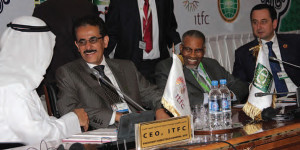
At the 38th annual meeting of the board of governors of the IDB Group held in Dushanbe, Tajikistan in May, it surfaced again.
The governor from Lebanon in his address to the plenary session warned that “the Sukuk issued by the IDB have helped increase resources. The fact that they are traded by some central banks and some are listed on the London Stock Exchange is the best proof the economic world’s confidence in them. We have, however, heard about the fuss and allegations around these Sukuk claiming that they are not compatible with the teachings of our noble religion. This understanding, as I see it, is wrong and the Bank should highlight the Shariah ruling in this regard and urge all those reluctant to work with the competent authorities to develop favourable conditions and unified structures and products”.
Controversy over Tawarruq, usually used as a liquidity and/or cash management instrument and once again fuelled by people with certain agendas, persist especially in the Kingdom, where SAMA, according to market players, has warned the market to sort itself out or face the consequences.
The issue of capital and resource mobilisation, however, is much more positive although there are certain anomalies and even ambiguities that may threaten the delicate strategy balance of raising funds from the international financial markets and over-relying on shareholder’s equity and callable capital.
In Dushanbe, two clear trends emerged. The board of governors of the IDB Group, cognisant of the projected increased demand by its 56 member countries on the multilateral’s resources and the call to fund projects that are aimed at generating employment especially for the youth, rose to the occasion with a vengeance.
They approved, on the one hand, a massive increase in the bank’s authorised capital to ID100bn (100bn Islamic Dinars) (about $150bn) from the current ID30bn; and in the bank’s subscribed capital from ID18bn to ID50bn ($75bn) respectively. This makes the IDB the largest multilateral in terms of subscribed capital compared to peer institutions such as the World Bank, Asian Development Bank and the African Development Bank.
On the other hand, they strongly urged the IDB also to diversify its source of funding by utilising its Triple A rating by each of the three major international credit rating agencies (Standard & Poor’s, Moody’s and Fitch), and its Zero Risk Weighting by the Basel Committee on Banking Supervision and the European Commission, to raise funds from the international capital markets primarily through the issuance of trust certificates (Sukuk).
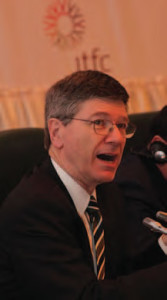
meeting on agriculture and food security
Saudi Finance Minister and IDB Governor, Ibrahim Al-Assaf confirmed in Dushanbe that “a proposal is being put forward to conceive plans to enhance financial leverage (in this respect)”.
However, as far as the capital increase is concerned, there is a catch that potentially has far greater ramifications. As the Turkish Governor to the IDB emphasised, “the IDB Group has undergone a significant financial, operational and institutional transformation programme. We appreciate the significant shift in resource mobilisation and lending capacity of the IDB. Shareholders’ commitment and support to IDB continues to be very strong. However, most members of the IDB have scarce financial resources, while the capital contributions might be a burden for some. Therefore, the IDB should be in a position to emit funding to its members by taking the advantage of its international reputation rather than absorbing funding from members. IDB should focus more on the mobilisation of off balance sheet resources”.
The board of governors also increased the bank’s resources by calling up an overall amount of ID 3.6bn ($5.4bn) under the 4th General Capital Increase. At the same time, the bank announced last year a 5th General Capital Increase, which, post-Dushanbe, is now open to subscription.
There are those who emphasise that the wealthier IDB member countries who can afford to subscribe to the new capital increase have an inherent advantage over the less wealthy member countries because they will accumulate more voting rights and, therefore, exercise a disproportionate influence over the policy, financing and decision-making process of the Bank.
IDB President Dr Ali is under no illusion regarding the task of callable capital mobilisation. Take, for instance, the Islamic Solidarity Fund for Development, which is a $10bn standalone fund separate from IDB Ordinary Resources. Of the $10bn subscribed, only a paltry $2.68bn have actually been paid up, with Kuwait, the latest member country, paying up its commitment.
Indeed, many of the less wealthy IDB member countries are in arrears in terms of their subscribed capital commitments. And several have approached the bank for a grace period to meet these commitments, which in turn has a knock-on effect on the general resource mobilisation strategy of the bank.
“Expanding the bank’s programmes and increasing its activities,” explained the governor from Lebanon, “requires lots of resources and liquidity. The bank has done well by proposing the Fifth Capital Increase. We propose that countries, like Lebanon, which have not paid their contributions under the Fourth Capital subscription for political reasons that are well known to the president, will be given the opportunity to pay the fourth and fifth subscriptions together under the prescribed conditions.”
Raising funding from the international financial markets presents its own challenges. These are primarily related to the inherent conservatism of the IDB’s debt financing programme and the high cost of funding, which in turn, according to several member countries, impacts negatively on the competitiveness of the IDB’s trade and project financing compared to peer supranationals and the private sector institutions.
They maintain that the multilateral is not leveraging its Triple A rating, its general creditworthiness and financial soundness in raising money more efficiently from the capital markets and thus passing on any pricing benefits to member countries through competitive terms for its trade finance, instalment sale and development finance facilities.
Given its whopping increase in subscribed capital to $75bn, the IDB is in a unique position to substantially increase its debt-to-equity ratio. This means it can afford to go to the market to raise funds through far more frequent Sukuk issuances and in larger volumes. This in turn would lower the cost of raising financing through such issuances compared to peer institutions.
Currently, the bank’s debt-to-equity ratio is 62 per cent, which is ultra-conservative. Fortunately, in Dushanbe, the board of governors agreed that this should gradually rise to 100 per cent, which is still conservative compared to other major development banks, which are much more highly leveraged, carrying debt amounting to between two and three times equity capital.
Egypt and Morocco led the chorus for the bank to capitalise on its ratings to increase its capacity to mobilise resources from the world financial markets at competitive rates to meet the needs of member states.
“We expect the Bank Group – which includes its trade finance fund, the Dubai-based Islamic Trade Finance Corporation (ITFC) and its private sector funding arm, the Islamic Corporation for the Development of the Private Sector (ICD) – to review its pricing policy and terms and formalities of funding for it to be more competitive than the other finance institutions. This will also contribute to the reduction of project funding costs in member states. Mobilisation of such funds should be more frequent as that reduces dependence of the Bank Group on member states for supporting its capital,” echoed the governor from Egypt.
Morocco went even further urging the bank to devise more concessionary financing facilities to aid GDP growth, balance-of-payments financing, and to promote greater intra-IDB trade which currently stands at about 17.5 per cent of the total trade of member countries.
Dr Ali, to his credit, acknowledges that “the bank’s operations must increase and its business and performance must improve significantly so that it can maintain its AAA credit rating and thus better qualify to mobilise resources from the market under good terms and conditions.”
The IDB board of executive directors, in fact, recently increased its Sukuk Programme from $6.5bn to $10bn, which observers believe is still too conservative, which paved the way for the latest IDB Sukuk issuance in May – a 5-year Fixed Rate Senior Unsecured $1bn Sukuk Al-Wakala, which was priced at a profit rate of 1.535 per cent per annum.
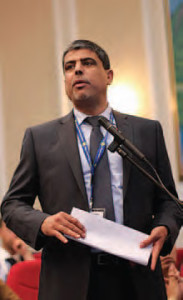
finance IDB
Dr Abdul Aziz Al Hinai, vice president finance, who heads the bank’s resource mobilisation strategy, was adamant that the deal “achieved our main objectives to continue building on the success of our prior deals and achieving even better pricing for the Sukuk. We hope that this lower cost of funding in spread terms will allow us to extend even better financing terms to our member countries to meet their developmental needs”.
The deal priced approximately 20 basis points inside the secondary market levels to result in the lowest spread over mid-swaps ever achieved by the IDB for a public US dollar-denominated Sukuk transaction. “This achievement is a clear outcome of IDB’s continuing efforts to position itself closer to its supranational peers,” explained the IDB in a statement.
However, the pricing is still between 20 to 40 per cent higher than peer institutions and demand for the Sukuk certificates was over-subscribed a mere one-and-a-half times and nowhere near the oversubscription seen for some of the GCC sovereign and quasi-sovereign issuances over the last two years, some of which have been oversubscribed by more than 10 times.
The market is keen for the IDB to embark on a much more ambitious Sukuk issuance programme, which encapsulates greater frequency of issuances, even larger sizes and much longer tenors or even multi-tenor issuances ranging from five to 30 years.
Indeed, the figures for the latest financial year ending in February 2012 show that the IDB is a multilateral on the move. The IDB Group’s total financing approved in FY2012 increased by 18.32 per cent to $9.848bn compared to US$8.3bn in the previous year. This was largely due to a 47.1 per cent increase in the group’s approved trade financing to US$4.51bn in FY2012 compared with $3.06bn in the FY2011. Total project financing approved during the same period increased marginally to $5.334bn from US$5.242bn respectively.
The Group’s trade financing activities are largely carried out through its standalone trade finance fund, ITFC, which is spearheading the stated ambition of the group to increase intra-OIC trade to 20 per cent by 2015. The ITFC in FY2012 approved a record volume of trade financing totalling $4.5bn compared with $3bn in the previous year.
Actual disbursements were also up in the period to $3.9bn from $2.8bn. This is partly due to the support of export and commercial credit insurance provided by ITFC’s sister IDB entity, the Jeddah-based Islamic Corporation for the Insurance of Investment and Export Credit (ICIEC), the standalone multilateral export credit agency of the IDB Group.
According to ICIEC’s latest annual report FY2012, the Corporation’s Comprehensive Short Term Policy (CSTP), which provides whole-turnover export credit insurance solution to policyholders, continued to dominate business insured. This was followed by Foreign Investment Insurance Policy (FIIP) and The Documentary Credit Insurance Policy (DCIP), which together with the Bank Master Policy Murabaha are the main trade and credit insurance products of ICIEC.
The continued uncertainty in the Arab Spring countries and the turmoil in the Mashreq countries have affected ICIEC’s trade-related insurance underwriting especially to these countries. However, the market conditions in turn has seen a dramatic rise in demand for investment or political risk insurance (PRI)
Business insured under the Corporation’s PRI programme totalled at a record high of $825m in FY2012 – an increase of 167 per cent on the previous year.
Dr Abdel Rahman, CEO of ICIEC, emphasises that this is due to the increased awareness of the importance of involving multilaterals such as ICIEC in new investment programmes. “A significant part of this increase in the PRI numbers can also be attributed to the growing relationship ICIEC is building with the Multilateral Investment Guarantee Agency of the World Bank (MIGA), which views ICIEC as a strategic reinsurance partner in its member countries.”
Dr Taha adds that this has been achieved despite the fact that ICIEC continues to face very strong competition from global export credit insurance providers, all of which are expanding their operations in ICIEC Member Countries, especially since growth in their home markets of Europe has stalled.
The corporation, however, reported new insurance commitments, down by 31 per cent to reach $2,314m in FY2012 compared to $3,364m in the previous year. This decline, according to ICIEC, is mainly attributed to the low business generated under the Documentary Credit Insurance Policy (DCIP), and the Specific Transaction Policy and is a reflection of the hardening in the corporation’s risk appetite due to the economic difficulties prevailing worldwide, and the political instability in some member countries.
Although the new commitments show a drop, the current (outstanding) commitments, which are a cumulative figure, indicate an increase of 16 per cent compared to last year.
The business insured or actual utilisation of commitments decreasing slightly by 1.6 per cent to $3,074m from $3,123m for the same period. This was mainly due to the cancellation of short term policies and non-materialisation of some transactions under the DCIP. This decline in short-term business was, however, offset by the sharp increase of business insured of the Foreign Investment Insurance business, which registered $825m in FY2012, compared to $310m in the previous year. The cumulative business insured by ICIEC, since its inception in 1994 stood at $16.39bn.
ICIEC, in fact, is looking ahead to major developments in 2013 through to 2014 with the launch of two new significant products – a Sukuk Insurance Policy, which will allow Sukuk issuers (initially sovereign ICIEC member countries) to utilise Sukuk to tap into capital markets, with an ICIEC insurance cover providing added security for Sukuk investors, against the non-payment risks of the Sukuk issuer/sponsor; and a Bank Master Policy for Istisna Financing, which will protect Islamic banks against non-payment risks of obligors in Istisna financing structures especially related to the construction and project industry.
According to Dr Taha, these products are “in line with ICIEC’s mandate to facilitate the flow of investments and project finance to its member countries. We are targeting sovereign Ijarah Sukuk at the outset, and will roll this product out to other forms of Sukuk in due course. This product will enable, in particular, those member countries, which are rated below investment grade or are unrated, to gain access to international capital markets. ICIEC’s insurance cover, given its Aa3 rating by Moody’s, will serve as a strong credit enhancement mechanism, and encourage international banks and investors to participate in such Sukuk offerings”.
 Cash And Trade Magazine For Cash and Trade professionals in the Middle East
Cash And Trade Magazine For Cash and Trade professionals in the Middle East





One comment